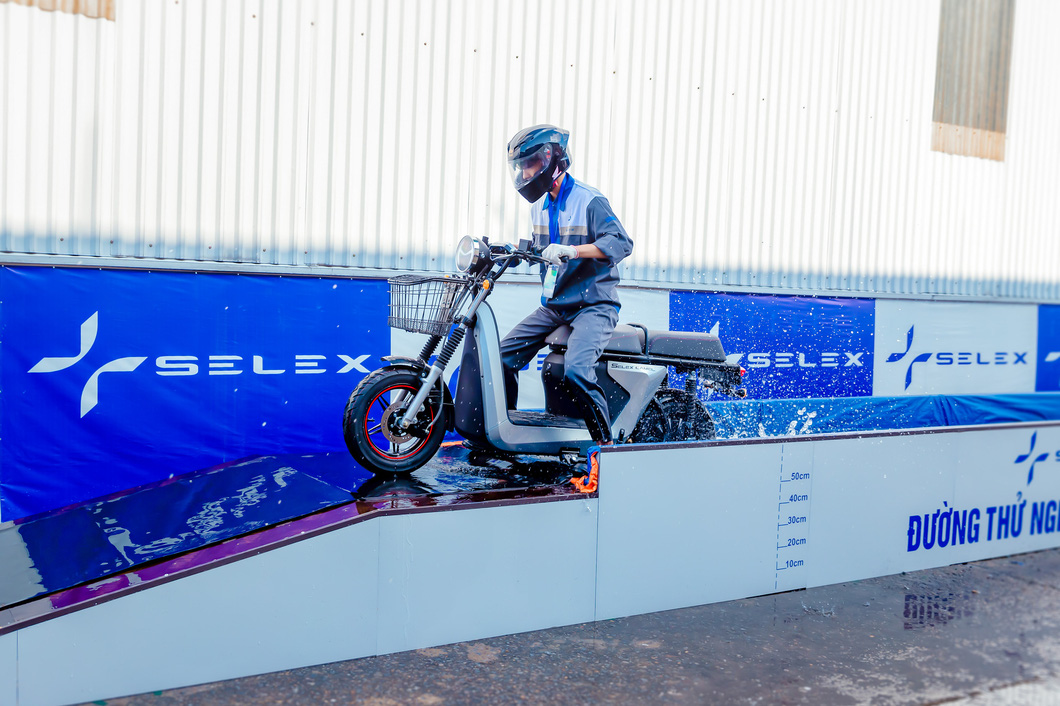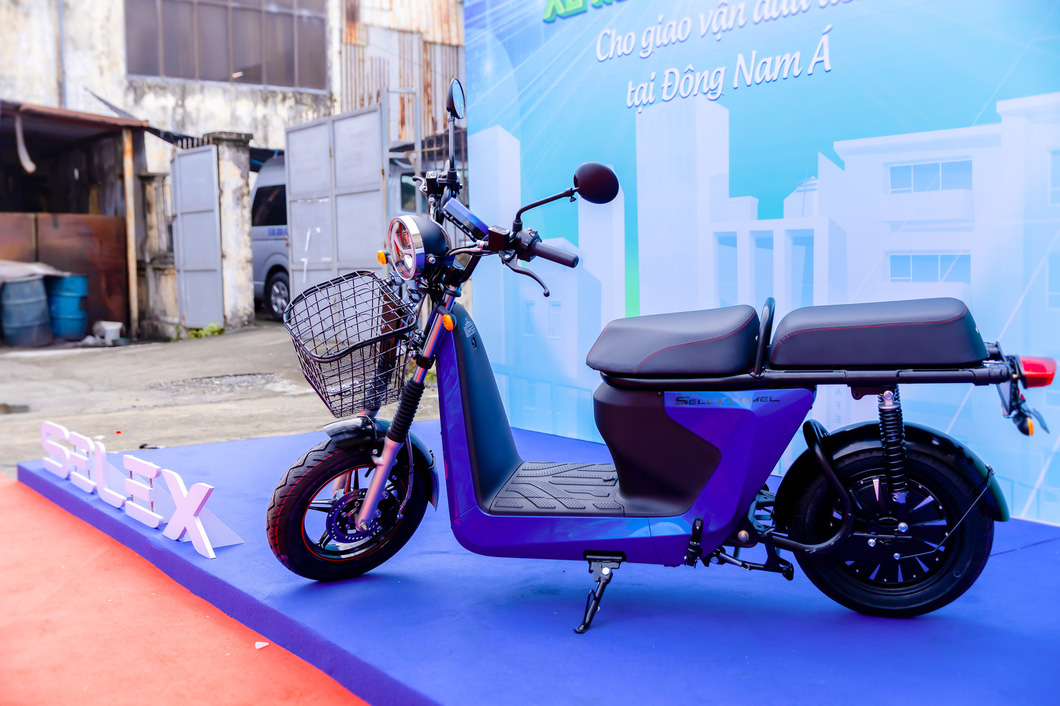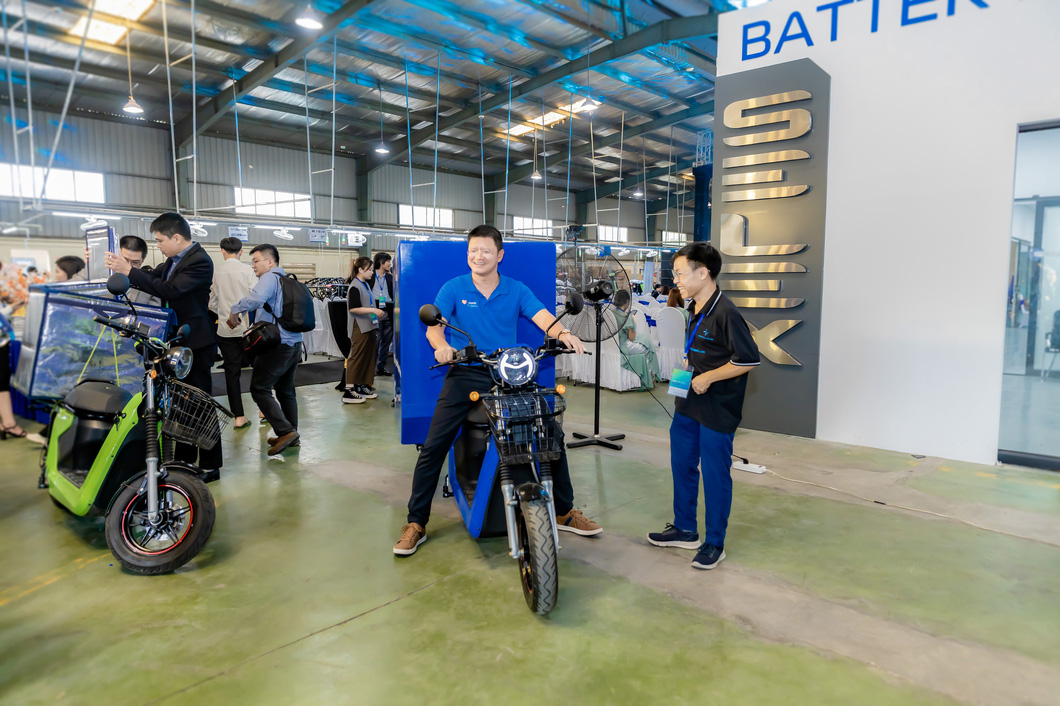Selex Motors, a Vietnamese start-up developing a smart electric scooter ecosystem in Vietnam, has helped define ‘Made-in-Vietnam’ electric vehicles (EVs), specifically electric scooters, as its products are completely manufactured in the Southeast Asian nation.
Selex Motors co-founders are Nguyen Huu Phuoc Nguyen, Nguyen Trong Hai, and Nguyen Dinh Quang.
Both Nguyen and Hai earned a PhD in mechanical engineering from the University of Michigan and worked for many companies in both the U.S. and Vietnam.
Meanwhile, Quang is an expert in software engineering and the Internet of Things (IoT), and has developed complicated national defense systems for enterprises in Israel.
Since late last year, Selex Motors’ first smart electric scooters have run on the streets in Hanoi.
The company has been expanding its ecosystem to many large cities, heading toward exporting the ecosystem to other Southeast Asian countries.
|
|
| An event to experience Selex Motors’ electric scooters. Photo: T.K. / Tuoi Tre |
EV is the future of transport
Selex Motors founders have high confidence in the future of smart EVs, which help optimize energy use and reduce emissions.
Nguyen Huu Phuoc Nguyen, CEO of Selex Motors, told Tuoi Tre (Youth) newspaper the reason why he and his fellows pursue a smart EV start-up, saying that “the world is entering a vehicle transition period with many issues which must be definitely resolved in the near future.”
The issues include air pollution and fuel price hikes after over a decade of using fossil fuels for most vehicles.
“The future of transport following gasoline-powered vehicles is smart EVs associated with technology,” Nguyen added.
Initiating their start-up with two-wheeled vehicles instead of cars, the CEO of Selex Motors explained that scooters are still a vehicle of choice in Vietnam and the trend cannot change overnight.
“With more than 50 million motorbikes in circulation which consume over US$5 billion worth of gasoline and discharge a huge volume of carbon dioxide, gasoline-powered motorbikes have seriously affected the environment and public health," Nguyen said.
“Fine dust and noise pollution have worsened over the years, while effective solutions to them have yet to come in place.
“If the coverage of electric motorcycles is wide enough, air and noise pollution will be tackled."
|
|
| Selex Motors’ electric pick-up scooter. Photo: T.K. / Tuoi Tre |
‘Made-in-Vietnam’ electric scooters
Before launching the Selex Camel electric delivery scooter model in 2022, the three co-founders of Selex Motors and their team had suffered great hardships.
They had jointly studied, designed, manufactured accessories, assembled, and run the first electric scooter on a trial basis in a room.
After five years, Selex Motors has developed an optimal ecosystem including Selex electric scooters, Selex batteries, Selex automatic battery swapping stations, and the Selex app helping manage the entire ecosystem.
“We are proud to say that Selex is a ‘made-in-Vietnam’ start-up. The entire ecosystem is developed in Vietnam by Vietnamese engineers,” Nguyen said.
The technology development, research, and manufacturing by itself have helped Selex effectively deal with issues related to EVs, specifically offering a reasonable price and installing battery swapping stations.
Selex electric ‘pick-up’ scooters are priced at below VND23 million (US$973.3) each.
In addition, the owners of these vehicles can swap batteries, which takes less than two minutes each, instead of having their vehicles charged for three to eight hours.
“Furthermore, the identification and payment [for the batteries] will be completed via QR code scans, which is more convenient," Nguyen said.
“To swap batteries, Selex vehicle owners use the Selex app to search for their nearest swapping stations. The app will also inform users of the number of usable batteries at the stations.”
Nguyen added that customers do not have to worry about the battery lifespan. By analyzing the behavior and habits of users, Selex can calculate the lifespan of its vehicles and batteries.
As Selex develops and operates battery swapping stations by itself, it can take the initiative in managing the quality of batteries and consider withdrawing the batteries for recycling after 10-14 years, ensuring the sustainability of the project, Nguyen said.
|
|
| Experiencing Selex Motors’ electric pick-up scooters at its factory. Photo: T.K. / Tuoi Tre |
Selex Motors has got 10 patents and five industrial design patents.
At present, Selex Motors’ factory can produce some 20,000 electric scooters and 100,000 lithium-ion batteries.
CEO Nguyen said Selex secured the first order from Lazada Logistics at the end of last year. The first batch of 100 Selex Camel electric pick-up scooters will be handed over to Lazada this year.
The company has also installed 30 battery swapping stations and expects to increase the number to 200 in Ho Chi Minh City and Hanoi.
“Following electric scooters, Selex may manufacture electric cars or buses in the future. We hope to become a pioneer in offering a sustainable traffic ecosystem in urban areas not only in Vietnam but also other regional countries,” Nguyen shared Selex’s vision.
Like us on Facebook or follow us on Twitter to get the latest news about Vietnam!




















































